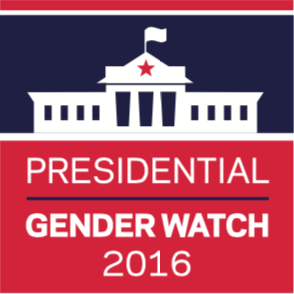Presidential Gender Watch 2016 Reflects on the Role of Gender in the Presidential Election at The Atlantic’s Politics & Policy Briefing
 In April 2015, the Barbara Lee Family Foundation (BLFF) and the Center for American Women and Politics (CAWP) launched Presidential Gender Watch 2016, a project to track, analyze, and illuminate gender dynamics in the 2016 presidential election. With the help of expert scholars and practitioners, Presidential Gender Watch worked for 21 months to further public understanding of how gender influences candidate strategy, voter engagement and expectations, media coverage, and electoral outcomes in campaigns for the nation’s highest executive office. The blog below was written for Presidential Gender Watch 2016, as part of our collective effort to raise questions, suggest answers, and complicate popular discussions about gender’s role in the presidential race.
In April 2015, the Barbara Lee Family Foundation (BLFF) and the Center for American Women and Politics (CAWP) launched Presidential Gender Watch 2016, a project to track, analyze, and illuminate gender dynamics in the 2016 presidential election. With the help of expert scholars and practitioners, Presidential Gender Watch worked for 21 months to further public understanding of how gender influences candidate strategy, voter engagement and expectations, media coverage, and electoral outcomes in campaigns for the nation’s highest executive office. The blog below was written for Presidential Gender Watch 2016, as part of our collective effort to raise questions, suggest answers, and complicate popular discussions about gender’s role in the presidential race.
How did gender influence candidate strategy, voter engagement and expectations, and electoral outcomes in the race for the nation’s highest executive office?
Panelists unpacked these themes during “The Politics of Gender: Women, Men, and the 2016 Election,” a discussion among political strategists, scholars, and commentators convened by The Atlantic, and underwritten by Presidential Gender Watch 2016,on December 13 at the Newseum in Washington, D.C.
A few takeaways emerged in conversations across the morning: Voters have higher expectations and set different standards for women running for executive office than they do for men; gender stereotypes and expectations – of both men and women – influenced candidates’ strategies and voter behavior; and women are not monolithic, as voters or candidates.
What follows is an outline of the event’s three panels, plus the underwriter perspective presented by Presidential Gender Watch 2016. A full recording of The Atlantic’s event is available here: http://www.theatlantic.com/live/events/the-politics-of-gender-2016/2016/.
Did Gender Matter?
The Atlantic‘s contributing editor, Peter Beinart, moderated a panel about the role of gender on the 2016 presidential race.
- Melissa Harris-Perry, the Maya Angelou Presidential Chair at Wake Forest University, emphasized the importance of intersectionality in any discussion about gender. Specifically, she spoke to the influence of African Americanwomen as a voting bloc. “It’s not women who vote for the Democratic Party, it’s Black women,” Harris-Perry said.
- Jen O’Malley Dillon, a deputy campaign manager on President Barack Obama’s 2012 campaign and co-founder of Precision Strategies, spoke to the double standard that existed for Hillary Clinton’s campaign team. ‘There are a lot that they just had to be perfect on,” Dillon said. “The reason they had to be perfect is because [Clinton is] a woman.”
- Margie Omero, a Democratic pollster who is executive vice president of public affairs at PSB Research, noted that “it was no surprise to women in our focus groups that men behaved badly.” Donald Trump’s misogynistic behavior was not de facto disqualifying to women who supported him because those women were willing to focus on things he was saying that they did like.
Case Study: One Woman's Win
Senator-elect Maggie Hassan of New Hampshire, currently the state’s governor, spoke with The Atlantic’s Yoni Appelbaum about her experiences running in the Granite State.
- A veteran of both executive and legislative races, Hassan spoke about the differences between the two types of races, stating “I do think that we need to see more women become chief executives so people get more used to it.”
- Hassan said that double standards do still exist for women, especially when it comes to media coverage. Reflecting on her most recent race against Senator Kelly Ayotte, Hassan noted that “Women are still perceived differently and, at times at least, we are held to different standards.”
- Hassan also spoke about some of the challenges women often face when runningfor office. Girls are often brought up “not to be a fuss,” she said, and this can make taking about yourself difficult. “It is a challenge to share your own personal self with others,” Hassan shared.
Playing the Gender Card when the Deck is Stacked: Candidates, Voters, and Biases
In a sponsor content session produced by Presidential Gender Watch 2016, experts reflected on 20 months of studying gender dynamics in the presidential race, and gave three key takeaways: women running for office still face unique obstacles and opportunities; women are not a monolith, either as candidates or as voters; and gender does not only refer to women.
- Barbara Lee, president and founder of the Barbara Lee Family Foundation, noted that the double standards Hillary Clinton faced in the 2016 race were nothing new. “Donald Trump wasn’t the first person to ask whethera woman looks presidential, or whether she has the stamina to lead,” Lee said.
- Adrienne Kimmell, executive director of the Barbara Lee Family Foundation, noted that Clinton was held to a different ethical standard than Trump because of her gender. Voters put women on a pedestal when it comes to morals and honesty; there’s an expectation of purity and virtue,” Kimmell stated. “Even a perceived infraction can cause women to tumble off the ethical pedestal voters place them on.”
- Dr. Kelly Dittmar, scholar at the Center for American Women and Politics, tackled the false assumption of gender affinity, or the idea that women would be more likely to vote for a woman candidate. “Few people expected Democratic men to vote for Trump this year simply because they share the same chromosomes, so perhaps we shouldn’t apply that logic to women either,” Dittmar said.
Looking Ahead: What 2016 Means for Gender and Politics
In a discussion led by The Atlantic’s Michelle Cottle, women journalists reflected on how they saw gender play out in the 2016 presidential race, and considered effects the 2016 race will have on women running for office in the future.
- “We’re just not used to hearing powerful women,” Jay Newton-Small, a correspondent for TIME Magazine and the author of Broad Influence, said. That made a difference in how voters viewed the presidential candidates, with Newton-Small noting that women candidates still face unique challenges when it comesto running for executive leadership, such as provingthat they’re tough enough while still remaining likeable.
- Nia-Malika Henderson, a senior political reporter with CNN, said that traditional masculinity was on full display duringthis election. “In this instance, it was very much Donald Trump who was playing the gender card,” Henderson stated.
- According to Newton-Small, “[The next election] has the potential to be like another Year of the Woman.” Henderson agreed that the 2016 election is unlikely to put a damper on women running for office, noting that “Now the question is – who is going to be the first woman president?
Presidential Gender Watch 2016 is also active on Facebookand Twitter. Followalong via #GenderWatch2016.
ABOUT PRESIDENTIAL GENDER WATCH 2016
Presidential GenderWatch 2016 is a nonpartisan project of the Center for AmericanWomen and Politics (Eagleton Institute of Politics, Rutgers University) and the Barbara Lee Family Foundation to track, analyze, and illuminate gender dynamics in the 2016 presidential election. It draws upon the research and expertise of both partner organizations, as well as other experts, to further public understandingof how gender influences candidate strategy, voter engagement and expectations, media coverage, and electoral outcomesin the race for the nation’s highestexecutive office. Our goal is to lend expert analysis to the dialogue around gender throughout the election season and transition period.


